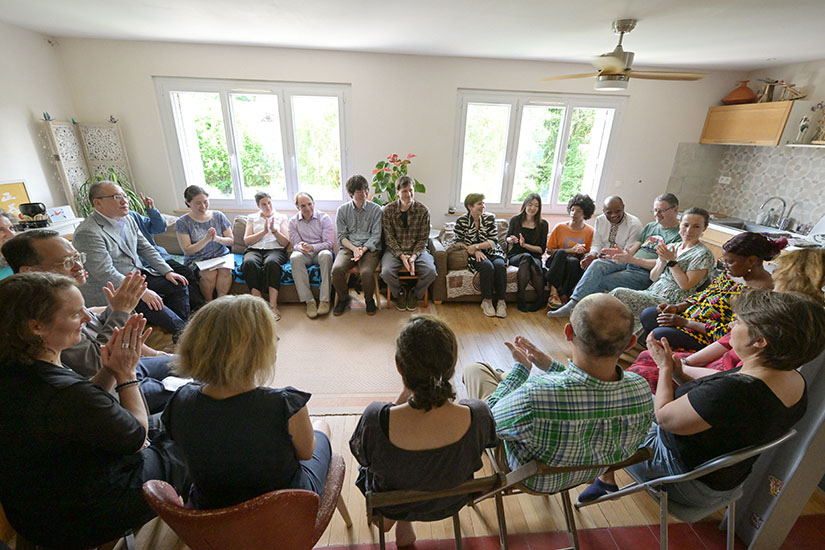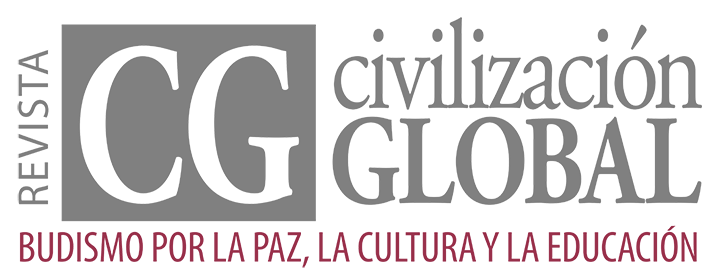Resources for the introduction of Spain Soka Gakkai’s discussion meetings
A woman who embraces the lion king of the Lotus Sutra never fears any of the beasts of hell or of the realms of hungry spirits and animals.
↳ Passage from The Drum at the Gate of Thunder, in WND-1, page 949. This letter is the sincere heart-to-heart exchange between mentor and disciple who are separated by a vast distance. It was written by the Daishonin at Mount Minobu on October 19, 1278, when, based on the traditional Japanese method of counting a person’s age in Japan, he was 57. It is addressed to the lay nun Sennichi, who lived far away across the mountains and the sea on Sado Island where the Daishonin himself had been exiled a few years before.
The Lotus Sutra is the lion king of the sutras. Therefore, the Daishonin encourages Sennichi, saying: “A woman who embraces the lion king of the Lotus Sutra never fears any of the beasts of hell or of the realms of hungry spirits and animals” (WND-1, 949). Here, he specifically says “a woman.” In the male-dominated warrior society of the day, women were generally in a very weak and disadvantaged position. We can speculate that Sennichi, as one of the Daishonin’s leading followers on Sado Island, may have encountered or heard of other women who were suffering due to illness, old age, or family problems, and may have sought the Daishonin’s advice on such matters. Or perhaps the Daishonin may have sensed some wavering or vacillation in Sennichi’s heart, which prompted him to write these words. Whatever the case may be, he warmly encourages her, assuring her that a woman who embraces the Lotus Sutra, the lion king of sutras, has absolutely nothing to fear.
(…) The power of belief leads to a state of mind free of fear or doubt, which is the very essence of what it means to have faith. No devilish function can possibly defeat a woman who has attained such a state of mind. A woman of deep faith who correctly practices the Mystic Law possesses the wisdom to instantly distinguish between right and wrong. She has the essential courage to sweep away the three poisons of greed, anger, and foolishness. She is endowed with an all-nurturing compassion. Inspired by the example of a teacher awakened to the Mystic Law, her wisdom, courage, and compassion fuse together in a firm, unwavering resolve. Such a woman will never be swayed by the maneuvers of any devilish function.[1]
In the section of this magazine which encourages us to read The New Human Revolution (this month we are concentrating on “A New Course” chapter) a passage which highlights the stance of several women pioneers of European kosen-rufu is mentioned. In the same installment we can read about them and the mission they had awakened to in the following words: “[they] were not professional missionaries (…). The task of realizing worldwide kosen-rufu has been shouldered by ordinary lay Soka Gakkai members, not clergy draped in “robes of authority.” And most of them have been women.[2] We can read more about this reflection below:
In the history of religion, there have been many cases in which propagation was carried out by the use of military force, political power, or economic might. But that directly contradicts the spirit of Nichiren Daishonin, whose life was devoted to transmitting his teaching through dialogue aimed at inspiring and empathizing with others. The greatest characteristic of Nichiren Buddhism is that its teachings have spread not through force but through the dedicated propagation efforts of ordinary men and women. This itself is testimony to the fact that it is a religion for the people.
In Shin’ichi Yamamoto’s eyes, each of these sincere members who was working so hard for kosen-rufu (…) was a Buddha.[3]

During the recent trip to France of an SGI delegation,[4] its members attended different discussion meetings, which are key settings for kosen-rufu. The General Director, Yoshiki Tanigawa, and the recently appointed Executive Director of Soka organization in France, Cathy Mahuet, attended one which was held in this town in the southwest of Paris.
Mailbox: prensa@ediciones-civilizacionglobal.com
[1] ↑ Extracted from this issue’s section «Estudio».
[2] ↑ IKEDA, Daisaku: The New Human Revolution, volume 10, chapter 3, installment 17.
[3] ↑ Ib.
[4] ↑ Please see the references in «Este mes» and «Actualidad».

